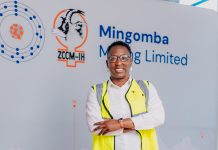If you thought going to the mall or shopping online represents the ultimate in spending, think again. When it comes to serious shopping, nothing beats procuring supplies for a major mine.
It involves shopping for tens of thousands of items, ranging from nuts and bolts to sophisticated machinery so big it has to be stripped down to its component parts in order to be transported to the mine. The items are sourced from a wide range of suppliers, based in locations ranging from Solwezi, the Copperbelt and Lusaka to Australia, Germany and the United States.
It involves spending mindboggling sums of money that can run to a hundred million dollars a month; the daily diesel fuel bill alone for a typical Zambian open-pit mine exceeds 250 000 litres. Yes – every single day. That’s enough to fill the tank of the average passenger car some 5 000 times. A mine’s monthly electricity bill easily runs to several million dollars.
Procurement spending can run to a hundred million dollars a month
But there are the small items too – ranging from milk, coffee and sugar to paper clips, printer toner and stationery. And behind all of those purchases are a dedicated team of people who keep it all coming in, on time and within budget. Nkomba Ndabala, Senior Procurement Officer at First Quantum’s Kansanshi mine, is one of them. She still remembers her first day at work back in 2005, when Kansanshi had just started operating.
“It was really confusing,” she recalls. “What’s a nut? A bolt? A washer? I vaguely knew the three were part of a set. But on the second day, I started making sense of things. Before long, I was enjoying it. I remember there was a breakdown on the plant, and this guy comes to me with a pickslip and says he wants three thousand nuts. You physically had to count them! It was a bit crazy back then, but that’s because we hadn’t yet put in the sophisticated computerised purchasing systems that we work with today.”
Like all of Zambia’s mines, Kansanshi has a set of policies and procedures aimed at sourcing as much as possible from local suppliers in Solwezi and the surrounding areas; what isn’t available there is sourced from further afield, mainly in the Copperbelt and Lusaka; and what isn’t available in Zambia is sourced from suppliers overseas. It’s all about getting the best possible goods or services, at the best possible price, and with the best level of reliability. Standards are high, and quality is non-negotiable – not least of all because mining is a business where lives are at risk.
But mine procurement isn’t just about the standard stuff; the Procurement Office also gets some unusual requests from various sections of the mine – for example, a rare spare part or item of machinery that might have been discontinued or isn’t on the lists of traditional suppliers. What happens then?
“You have to be resourceful,” says Ndabala. “Some items you know where to find because you’ve done it before, or someone else on the team has. But there are times you don’t know where to start. So, you phone around, you ask around, you scour the internet – and eventually you track it down. The supplier might be overseas, or you’ll find there’s a local agent in Zambia. That’s always first prize for us.”
What’s the most unusual item she has ever had to find? Ndabala smiles at the memory. “The Corporate Social Responsibility department once asked us to find some day-old chicks! Not two days or three days; they had to be exactly one day old. Something about vaccinations and medication. It was a farming project, I think. We had a bit of a laugh when that order came in. But we did find them.”

Ndabala says that tracking down a particularly elusive item that is sorely needed in the plant is the most rewarding aspect of working in Procurement. “Mining is very stressful, and everyone works under a lot of pressure. So, it’s really rewarding to call them up about their order and say – it’s here. That really makes their day.”
How about when orders are late? “Then it’s not that great. Sometimes suppliers let you down. Everything then gets delayed, and the mine has to shuffle things around. But you have to manage it, you chase it up. Sometimes tempers go up from the end users when under pressure, but guess what – we still owe them a smile and have to embrace them. We all need each other, and we can’t win until we all win.”
Ndabala has been in her job now for more than a decade, and has built up a wealth of experience in all aspects of procurement, from warehousing and stocking to systems and the procurement process itself. She loves her job, and says it’s made a huge difference in her life.
“Kansanshi has come through a lot of tough times and financial crunches, but it has always survived and thrived. It’s been a good discipline that I’ve adopted as an individual. It’s also been very rewarding on a personal level. I drive, I’m constructing a house, I help my parents and wider family. I am also able to spoil myself and go on vacation!”
And on that point, she has an interesting story to tell about how procurement is something that we all do in our personal lives, and how price is a key determinant. “You know, it’s often cheaper to fly to South Africa than to some places here in Zambia. Once, I was checking out ticket prices to Livingstone, and found that it was actually cheaper to fly to Durban and back! Our aviation people need to work on that.”
See also: Kansanshi at a crossroads























